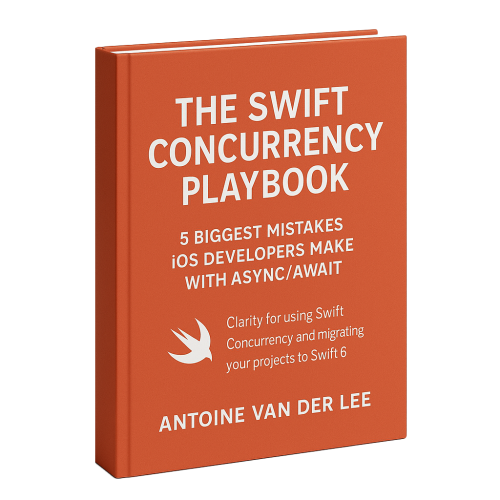Where is a powerful keyword within Swift to easily filter out values. It can be used in many different variants from which most of them are listed in this post.
Usage in a switch
Consider having the following enum:
enum Action {
case createUser(age: Int)
case createPost
case logout
}
Using where you can easily filter the case for a specific age range:
func printAction(action: Action) {
switch action {
case .createUser(let age) where age < 21:
print("Young and wild!")
case .createUser:
print("Older and wise!")
case .createPost:
print("Creating a post")
case .logout:
print("Logout")
}
}
printAction(action: Action.createUser(age: 18)) // Young and wild
printAction(action: Action.createUser(age: 25)) // Older and wise

FREE 5-Day Email Course: The Swift Concurrency Playbook
A FREE 5-day email course revealing the 5 biggest mistakes iOS developers make with with async/await that lead to App Store rejections And migration projects taking months instead of days (even if you've been writing Swift for years)
Usage in a for loop
Printing even numbers using a for-loop.
let numbers = [0, 1, 2, 3, 4, 5, 6, 7, 8, 9, 10]
for number in numbers where number % 2 == 0 {
print(number) // 0, 2, 4, 6, 8, 10
}
Usage in protocol extensions
Extending an Array type based on its element.
extension Array where Element == Int {
func printAverageAge() {
let total = reduce(0, +)
let average = total / count
print("Average age is \(average)")
}
}
let ages = [20, 26, 40, 60, 84]
ages.printAverageAge() // Average age is 46
Usage in first
Get a first element based on a condition.
let names = ["Henk", "John", "Jack"]
let firstJname = names.first(where: { (name) -> Bool in
return name.first == "J"
}) // Returns John
Usage in contains
Determine if an array contains a condition matching element.
let fruits = ["Banana", "Apple", "Kiwi"]
let containsBanana = fruits.contains(where: { (fruit) in
return fruit == "Banana"
}) // Returns true
Usage in initialisers
Conditional initialisers to only allow for certain types.
extension String {
init(collection: T) where T.Element == String {
self = collection.joined(separator: ",")
}
}
let clubs = String(collection: ["AJAX", "Barcelona", "PSG"])
print(clubs) // prints "AJAX, Barcelona, PSG"